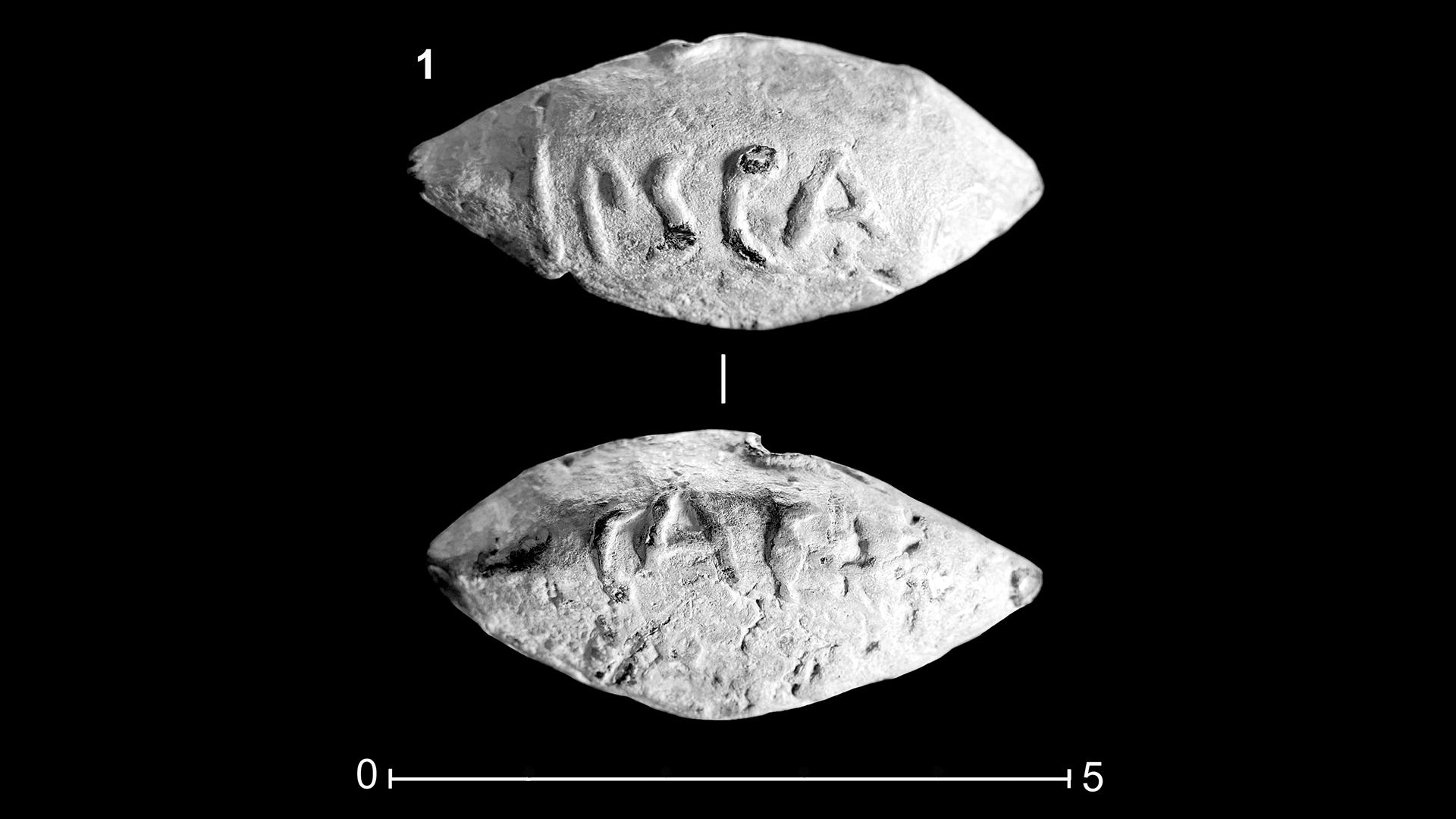2,000-year-old bullet found with Julius Caesar's name on it was likely used in civil war
The bullet's inscriptions hint that Indigenous people in Spain supported the would-be dictator, Julius Caesar, during the Roman civil war.

An almond-shaped lead bullet — inscribed with the names of Julius Caesar and an unknown city and likely fired from a slingshot — hints that Indigenous people in Spain supported the cause of the would-be dictator during his ultimately successful civil war more than 2,000 years ago, a new study finds.
As general, Caesar led the Roman army to victory in the Gallic Wars (58 to 50 B.C.). But unwilling to give up his newfound power, he famously crossed the Rubicon River on Jan. 10, 49 B.C., leading his chief political rival, Pompey the Great, to declare Caesar's action tantamount to a state of civil war.
Caesar's civil war (49 to 45 B.C.) spanned Europe, including Italy, Greece, Egypt, Africa, Spain and the Balkan Peninsula. The final engagement, on March 17, 45 B.C., is known as the Battle of Munda, which likely took place in Andalusia, in southern Spain. Tens of thousands of Pompey's troops were killed, and Caesar returned to Rome victorious.
Now, the analysis of the unique lead projectile is revealing details about the Spanish battles. For example, an inscription on the bullet points to an ancient town never mentioned in historical records of Caesar's civil war, according to the study, published in June 2023 in the journal Zephyrus.
The artifact is known to specialists as a "glans inscripta" — an inscribed bullet. Measuring 1.8 by 0.8 inches (4.5 by 2 centimeters) and weighing 2.5 ounces (71 grams), the projectile was made using a mold into which molten lead was poured. Engraved on both sides of the mold were letters, resulting in a bullet with raised inscriptions reading "IPSCA" on one side and "CAES" on the other. Part of the projectile was deformed, likely due to impacting a hard object when it was fired in antiquity.
Related: Ancient Roman 'spike defenses' made famous by Julius Caesar found in Germany
"IPSCA" almost certainly refers to an ancient town that was involved in the civil war between Caesar and Pompey, the researchers argued in their study, but none of the early written sources about the Spanish battles mention Ipsca. Given that the projectile was found near the city of Montilla — the probable location of Munda in Roman times — Ipsca was most likely involved in the last decisive battles of Caesar's civil war, they said.
Get the world’s most fascinating discoveries delivered straight to your inbox.
"In the 1st century BC, many inscribed glandes were made because they were very useful instruments for housing short, very specific messages," study lead author Javier Moralejo Ordax, an assistant professor of archaeology at the Autonomous University of Madrid, told Live Science in an email. The message on this particular projectile was likely meant as political propaganda and encouragement for Caesar's own troops, he said, namely that Ipsca supported Caesar rather than Pompey.
Only one other bullet with Caesar's name on it has been found in Spain. That one, from the province of Jaén, also carries a double inscription. It reads "CAE / ACIPE" — the Latin equivalent of "Suck it, Caesar" — most likely a message from Pompey's troops to their enemy.
Robert Morstein-Marx, a Roman historian at the University of California, Santa Barbara who was not involved in the study, told Live Science in an email that he finds the discovery interesting because, if the authors are correct about the Caesar abbreviation, "this is its first appearance on a bullet used by slingers in his army." The inhabitants of Ipsca, he said, "publicly declared their loyalty to Caesar to those on the other side who had chosen to fight for Pompey's sons."
This tiny bullet gives historians important new information, Moralejo Ordax said, because "most of the indigenous cities were loyal to Pompey and his sons." Ipsca, on the other hand, seems to have been allied with Caesar and "probably manufactured ammunition for Caesar's troops and perhaps provided [slinger] troops for his armies," he said.
In the end, the town of Ipsca may have helped Caesar secure a decisive victory in Spain, setting in motion a chain of events, from his historical appointment as dictator to the fall of the Roman Republic and the eventual rise of the Roman Empire.

Kristina Killgrove is a staff writer at Live Science with a focus on archaeology and paleoanthropology news. Her articles have also appeared in venues such as Forbes, Smithsonian, and Mental Floss. Kristina holds a Ph.D. in biological anthropology and an M.A. in classical archaeology from the University of North Carolina, as well as a B.A. in Latin from the University of Virginia, and she was formerly a university professor and researcher. She has received awards from the Society for American Archaeology and the American Anthropological Association for her science writing.
 Live Science Plus
Live Science Plus





